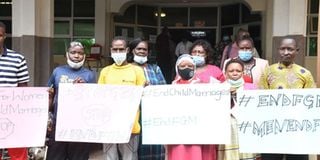Premium
Journalists must do more to change perceptions, shift gender stereotypes

Women and youths hold banners bearing Anti-FGM messages during Isiolo Women of Faith Network meeting in Isiolo town on November 7, 2020.
What you need to know:
- Sexual and Gender-Based Violence (SGBV) has been on an upward trend from March when Kenya reported the first Covid-19 positive case.
- SGBV and other forms of violations against girls and women can be fought through joint efforts by stakeholders.
Like the rest of the world, Kenya is marking the 16 Days of Activism against Gender-Based Violence.
The campaign, which kicked off on November 25 and ends on December 10, comes in the middle of a constitutional reform drive, where gender is a key issue in the Building Bridges Initiative (BBI).
Individuals, organisations and nations who use this period to strategise on prevention and eradication of violence against women and girls, may have to think deeper and harder on how to eliminate GBV, even as the world battles the Covid-19 pandemic.
In Kenya, Sexual and Gender-Based Violence (SGBV), mostly against women and girls, has been on an upward trend from March when the country reported the first Covid-19 positive case and started implementing strict health measures to contain its spread.
It is even more unsettling that even after some of the Covid-19 restrictions were relaxed, SGBV cases are still up with minors as the soft targets of sexual predators, perpetrators of physical violence and other violations and abuse, some of which has been attributed to frustrations due to economic hardship.
Human rights violations
However, economic hardship and poverty must never be used as excuses for rape, defilement, domestic violence and human rights violations against the society’s vulnerable.
Such perpetrators, irrespective of their status and reasons or excuses for their crimes, belong to jail because they are criminals.
Other perpetrators and individuals who must now be handled are those that continue to subject girls to the outdated practice of Female Genital Mutilation.
These heartless men and women and their crude actions continue to destroy the lives of girls, who once subjected to the cut, are forced into “marriage’’, never mind they are still children.
Some parents, guardians and relatives in certain areas where the retrogressive practice is rife, have been taking advantage of the Covid-19 crisis to force the cut on the girls.
In areas such as Migori, for instance, individuals have been known to collude with others across the border to circumcise girls, whom they expose to all manner of risks. In so doing, they are also frustrating Kenya’s stated 2022 target for elimination of the outdated practice.
However, the good news is that SGBV and other forms of violations against girls and women can be fought through joint efforts by stakeholders.
The media is the most crucial of the stakeholders, given that its role is crucial in either changing or entrenching stereotypes and propagating attitudes towards SGBV and specifically, violence against girls and women.
In addition, the role of journalists in creating and increasing awareness of SGBV and other violations of girls’ and women’s rights and doing so objectively, cannot be gainsaid.
Regular training
At a sitting hosted in Nairobi by the Voice for Women and Girls Rights-Kenya (VWGRs), a Journalists for Human Rights (JHR) project, ahead of the global campaign, it was uplifting to listen to the journalists’ honest conversation on the role they play or can play in shifting perceptions and attitudes to women and gender-based stereotypes.
Investing more in reporting on and creating interest in SGBV cases and doing so fairly on the same, were some of the observations made at the VWGR forum .
There were concerns on how often gender attitudes are interrogated during media recruitment and performance processes as well as the need for accountability and expectations on gender issues, arose.
In addition, it is important for journalists/the media to re-examine conflict resolution coverage and specifically the tendency by some to capture only negative experiences of women and girls during such times.
It is important for media houses and journalists to ensure constant training/learning on the principles and ethics of reporting on Sexual and Gender-Based Violence.





